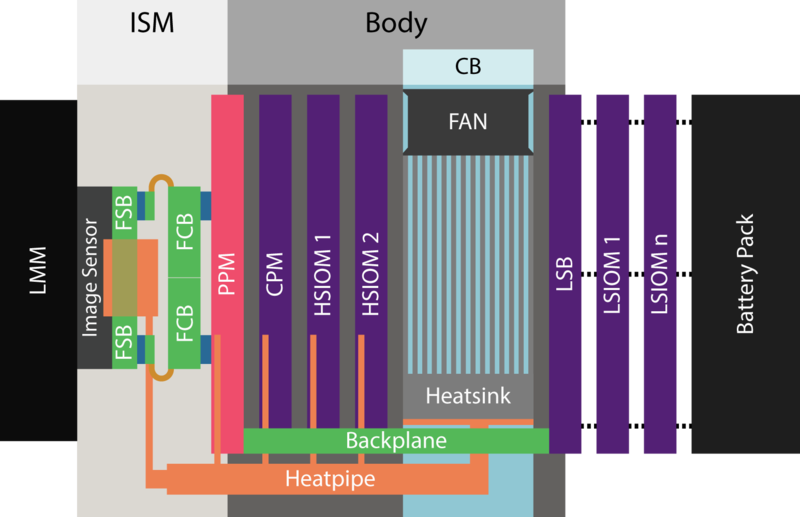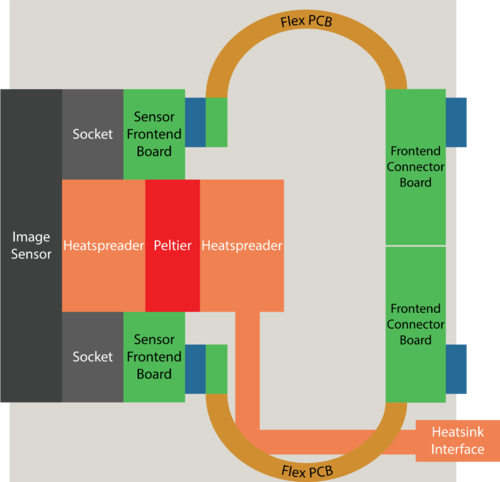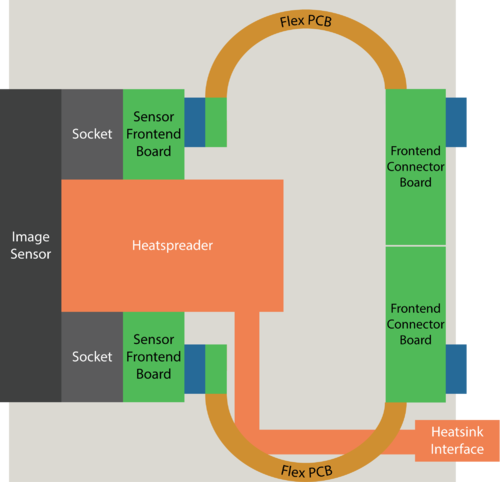Difference between revisions of "AXIOM Gamma"
| Line 72: | Line 72: | ||
Connections are typically 4 lanes, either connected directly or via a high-speed mux. The theoretically achievable data-rate would be 10Gbps per lane (the limit of the mux, allthough the FPGA transceivers are not much faster), but the practically reachable data rate will likely be lower depending on EMI-performance, power-consumption and board losses. For a 4K raw image stream, only a fraction of the theoretical speed is needed. | Connections are typically 4 lanes, either connected directly or via a high-speed mux. The theoretically achievable data-rate would be 10Gbps per lane (the limit of the mux, allthough the FPGA transceivers are not much faster), but the practically reachable data rate will likely be lower depending on EMI-performance, power-consumption and board losses. For a 4K raw image stream, only a fraction of the theoretical speed is needed. | ||
===Cooling Bay=== | ===Cooling Bay (CB)=== | ||
Cooling will be done as Module (Central heatsink plus fan). | Cooling will be done as Module (Central heatsink plus fan). | ||
Revision as of 06:57, 20 August 2015
1 Module Block Diagram
2 Optical Modules
2.1 Lens Mount Module (LMM)
2.2 Optical Filter Module (OFM)
Optional.
2.3 Image Sensor Module (ISM)
The image sensor in the AXIOM Gamma will be mechanically adjustable in dimensions of flange focal distance (back focus = Z-axis), a shift in XY-axes and XYZ rotation.
For creating space for the heatpipes and decoupling the image sensor from the rest of the module two rigid-flex PCBs are added to the existing designs. The rigid part of the rigid-flex PCB will be screwed to the back of the module exposing the connectors to the back.
Two cooling options:
- passive: Copper heatpipes
- active: Peltier element behind sensor (see below)
Peltier:
Usage of a Peltier-element proves to be problematic:
High power consumption renders mobile usages inefficient
Power consumption within the Peltier generates more additional heat
Water condensation within the electronics on the cool Peltier side, requirement of sealing -> increased complexity of manufacturing, design, maintenance, repairs, etc.
Conclusion:
Sensor front end module without Peltier element for general usage, one version with Peltier element for people who are aware of the implications and/or for experimentation purposes
2.3.1 Sensor Frontend Board (SFB)
2.3.2 Frontend Connector Board (FCB)
3 Front Module
3.1 Pre-Processing Module (PPM)
Sensor access is implemented by using a Xilinx Kintex-7 160T FPGA.
Captures raw image date from the sensor and responsible for general “raw” processing of the sensel (image sensor pixel) values, e.g. spatial and temporal binning of the raw data if lower resolutions and/or frame rates are desired in subsequent processing steps.
Board-To-Board Connection (B2B)
Finger on backplane and PCIE-164 connector on PPM.
For sensor adjustment a PCIE Riser card can be used to detach the PPM and the ISM from the Body and still access the set screws.
4 Body
4.1 Backplane
Connects PPM, CPM and HSIOMs via high-speed serial links and LSIOM via low-speed links.
Backplane circuitry include the power consumption measurement and management of an external Battery and also hot-plug detection and powering of the modules.
The Backplane contains a muxed JTAG interface to allow debugging of all add-on boards via a central connector.
4.2 Core Processing Module (CPM)
Most likely a Zynq 7030 FPGA + dual ARM core System on Chip (SoC).
4.3 2x High Speed I/O Module Slots (HSIOM)
Also called High Speed Module
Generally used for storage, input or output of high-speed signals. Typical examples would be SSD storage, HDMI/SDI output or SDI input.
For this reason, the HSIOMs have dedicated high-speed access to the preprocessed image data coming from the PPM and the processed Data from the CPM.
Connections are typically 4 lanes, either connected directly or via a high-speed mux. The theoretically achievable data-rate would be 10Gbps per lane (the limit of the mux, allthough the FPGA transceivers are not much faster), but the practically reachable data rate will likely be lower depending on EMI-performance, power-consumption and board losses. For a 4K raw image stream, only a fraction of the theoretical speed is needed.
4.4 Cooling Bay (CB)
Cooling will be done as Module (Central heatsink plus fan).
The backplane needs to account for that as it will have to go “around” the Cooling Bay.
4.5 Low Speed Bridge (LSB)
Finger on backplane and PCIE-164 connector on LSIO Bridge.
5 Stackmodules
Docking to LSB
5.1 Low Speed IO Modules (LSIOM)
No high-speed access to raw image data stream, but are connected to CPM and PPM via multiple LVDS lanes to allow medium-rate traffic (1-2 Gbps total shared across all LSIOMs).
Typical examples: Audio, Timecode, Trigger or Genlock inputs/outputs, Gyroscopes, Accelerometers, GPS modules.
5.2 Battery Mount
Last LSIOM in stack.
6 PCB Specifications
Main PCB dimensions are defined to be 111mm width and 125mm height at max.
7 Deliverables
Deliverable D1.3 AXIOM Ecosystem Launch Documentation
Deliverable D2.1 AXIOM Gamma ISFE - Hardware Design Documents
Deliverable D2.2 AXIOM Gamma ISFE - Hardware Manufacturing Research/Documentation
Deliverable D2.3 AXIOM Gamma ISFES - Software
This page is work in progress.
8 Mandatory on all publications
This project has received funding from the European Union’s Horizon 2020 research and innovation programme under grant agreement No 645560



